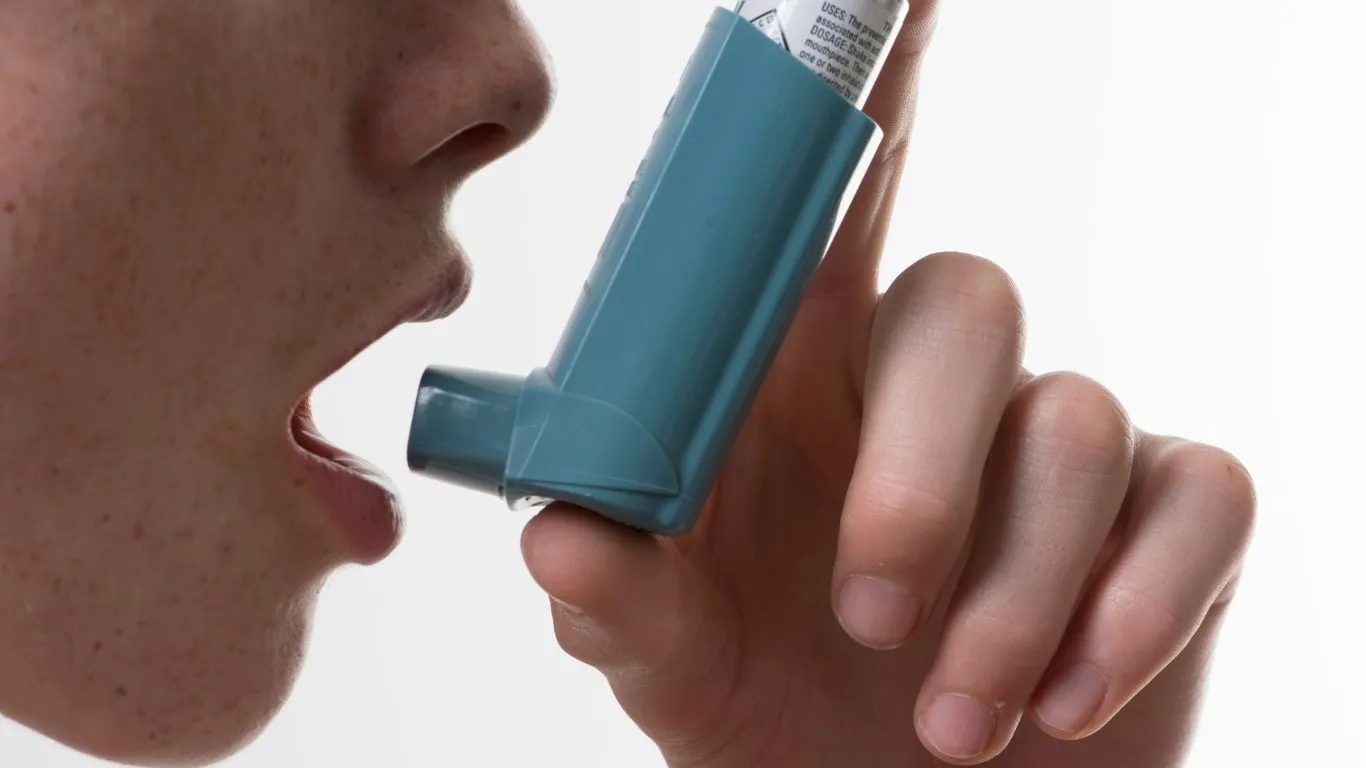10 Best Ways to Protect Your Lungs from Asthma Triggers
As someone who has spent years caring for patients with respiratory issues, I’ve seen firsthand just how challenging asthma can be. One of the most frustrating aspects of asthma is dealing with the various triggers that can cause symptoms to flare up. For many people, these triggers are unpredictable, and managing them can often feel like a full-time job. As a pulmonary nurse, my goal has always been to help people not only manage their condition but also prevent asthma attacks before they start. In this article, we’ll dive into the best ways to protect your lungs from asthma triggers—because prevention is always better than treatment. Let’s explore some strategies that can help you breathe easier and live life to the fullest.
Identifying Common Asthma Triggers

Before we talk about how to protect your lungs from asthma triggers, it’s essential to understand what those triggers are. Asthma triggers are substances or conditions that can cause an asthma attack or worsen existing symptoms. While triggers can vary from person to person, there are a few that seem to pop up more frequently. Here are some common ones:
- Allergens: Pollen, mold, pet dander, dust mites—these are all common allergens that can irritate your airways and bring on an asthma attack.
- Air Pollution: Poor air quality, especially from smog and vehicle exhaust, can trigger asthma symptoms. If you live in a city with a lot of pollution, this may be a bigger concern for you.
- Cold Air: Breathing in cold, dry air can cause your airways to tighten and trigger asthma symptoms, especially during the colder months.
- Exercise: While exercise is great for overall health, it can also be a trigger for some asthma patients, especially if they don’t warm up properly.
- Smoke: Whether it’s cigarette smoke or smoke from a bonfire or campfire, smoke is a major asthma irritant.
Understanding what causes your asthma symptoms is the first step in preventing them. But, once you know your triggers, how do you actually protect your lungs from them? That’s what we’ll dive into next.
Protecting Your Lungs: Everyday Strategies

Protecting your lungs from asthma triggers requires a combination of lifestyle changes, precautions, and sometimes medications. In my years of experience as a pulmonary nurse, I’ve found that the most successful asthma management plans involve small but consistent changes that make a big difference over time. Here are some of the best ways you can protect your lungs from asthma triggers:
1. Create an Asthma-Friendly Home Environment
One of the first places you can start when trying to minimize exposure to asthma triggers is right at home. I can’t tell you how many times I’ve seen patients struggle with indoor allergens like dust mites or pet dander. A few simple changes around the house can drastically improve your quality of life:
- Keep your home clean and dust-free: Regular cleaning is key, especially when it comes to areas where dust tends to accumulate. Vacuum with a HEPA filter, and wipe down surfaces often. The less dust, the better.
- Wash bedding regularly: Dust mites thrive in bedding, so wash your sheets and pillowcases weekly in hot water to kill any mites.
- Use air purifiers: Investing in a good quality air purifier can help filter out allergens from the air, especially if you live in a city with high levels of pollution.
- Keep pets out of the bedroom: Pet dander can be a major trigger, so keeping your pets out of your bedroom (and off your bed) can help reduce exposure.
- Control humidity: Mold thrives in humid environments, so use a dehumidifier to keep the air in your home dry and prevent mold buildup.
2. Avoid Exposure to Smoke and Pollution
Smoke—whether from cigarettes, fireplaces, or pollution—can have an immediate and severe effect on people with asthma. I always tell my patients to be vigilant about avoiding smoke-filled areas whenever possible. Here’s how you can protect yourself:
- Avoid secondhand smoke: If you’re around people who smoke, ask them to step outside. Don’t hesitate to leave spaces where smoking is allowed.
- Stay indoors on high pollution days: If air quality is poor (which you can usually check on local weather apps), try to stay inside as much as possible.
- Consider using a face mask: If you live in an area with high pollution or if you need to be outside on a bad air day, wearing a mask can help filter out some of the harmful particles in the air.
3. Prevent Cold Air Exposure
Cold air can be a trigger for many asthma sufferers, especially during the winter months. It’s a common complaint I hear from patients who find it hard to breathe when temperatures drop. Here are a few ways you can protect yourself from cold air:
- Cover your mouth and nose: Wearing a scarf or face mask can help warm the air before it enters your lungs. This is especially important if you’re outside in cold weather.
- Stay indoors during extremely cold days: On days when temperatures drop drastically, try to stay indoors where it’s warm and safe.
- Use a humidifier: Cold air can also be dry air, which can irritate your airways. A humidifier can help add moisture to the air, making it easier to breathe.
Using Medication to Manage Triggers

Even with the best preventive strategies, asthma triggers can still sneak up on you. That’s where medication comes in. In my experience, patients who have a good medication routine alongside lifestyle changes tend to manage their asthma symptoms the best. There are two main types of asthma medications:
- Quick-relief (rescue) inhalers: These provide fast relief when you feel an asthma attack coming on. Always keep your inhaler nearby, just in case.
- Long-term control medications: These are used daily to prevent asthma symptoms from occurring. They include corticosteroids and other long-acting bronchodilators.
Consult your healthcare provider to determine the right medication plan for you. Don’t skip your medication, even if you’re feeling good, as consistency is key to long-term asthma control.
Making Lifestyle Adjustments to Reduce Asthma Triggers

Managing asthma is not just about medications and treatments—it’s also about making lifestyle changes that can minimize exposure to the triggers. As someone who’s worked with numerous asthma patients, I’ve seen that small but consistent lifestyle changes can make a huge difference. Whether it’s your diet, exercise routine, or even stress levels, everything plays a role in asthma management. Let’s talk about how you can make those adjustments to reduce asthma triggers in your daily life.
4. Eating a Healthy Diet
While diet isn’t often the first thing people think about when managing asthma, the food we eat can have a big impact on our respiratory health. Personally, I’ve noticed that many of my patients who struggle with asthma also have other underlying health issues, such as being overweight or having high levels of inflammation in the body. These factors can worsen asthma symptoms. The good news is that eating a healthy, balanced diet can help reduce inflammation and improve your overall health, including lung function.
- Focus on anti-inflammatory foods: Foods rich in antioxidants, such as fruits and vegetables, can help reduce inflammation in the body. Omega-3 fatty acids, found in foods like salmon and flaxseeds, are also great for lung health.
- Avoid food triggers: Some people find that certain foods—like dairy or processed foods—can trigger their asthma. Keep track of how your body reacts to different foods and try to avoid the ones that seem to worsen your symptoms.
- Stay hydrated: Drinking enough water helps keep your airways moist, which can make it easier to breathe. Aim for about 8 cups of water a day, especially if you’re exercising or live in a dry climate.
5. Exercising with Asthma
Exercise is important for overall health, but for people with asthma, it can sometimes feel like a challenge. I’ve had patients tell me they avoid exercise because they fear it will trigger an asthma attack. While I totally understand the concern, exercise doesn’t have to be off-limits. In fact, regular physical activity can help strengthen your lungs and make it easier to control your asthma in the long run. The key is to approach exercise cautiously and with the right precautions.
- Warm up properly: Starting with a gentle warm-up can help prevent your airways from constricting during exercise. Gradually increasing the intensity of your workout is a good idea.
- Choose the right type of exercise: Low-impact exercises like swimming, cycling, or walking are great for people with asthma. Swimming is particularly beneficial because the warm, moist air helps prevent your airways from drying out.
- Keep your inhaler nearby: If you’re heading out for a run or workout, make sure you have your rescue inhaler with you, just in case. It’s always better to be prepared.
- Avoid exercising outdoors during bad weather: Cold, dry air or high pollen counts can trigger asthma symptoms, so it’s best to avoid outdoor exercise on those days.
Understanding the Role of Stress in Asthma Management

If you’ve ever noticed your asthma symptoms worsening when you’re stressed, you’re not alone. Stress and anxiety can have a huge impact on asthma, making it harder to manage. In my experience as a pulmonary nurse, I’ve seen many patients struggle to breathe during stressful situations. The connection between stress and asthma is real, and it’s something that can’t be ignored. Stress triggers the release of hormones like cortisol, which can cause inflammation in the body and make it harder to breathe.
But here’s the good news: there are ways to manage stress that can help you control your asthma. It’s all about finding healthy ways to cope and keep your stress levels in check. Let’s look at some strategies:
6. Practice Deep Breathing and Relaxation Techniques
Deep breathing exercises can do wonders for both stress reduction and asthma management. By learning to control your breathing, you can help reduce the tightness in your chest and ease your anxiety. Here are a few techniques you can try:
- Diaphragmatic breathing: This technique involves breathing deeply through your diaphragm (rather than shallow breaths from your chest). It helps activate the relaxation response in your body and can reduce stress.
- Progressive muscle relaxation: This method helps you relax by focusing on tensing and releasing different muscle groups. It’s a great way to release tension in your body and calm your mind.
- Mindfulness meditation: Mindfulness helps you stay in the present moment and calm your mind. Apps like Headspace or Calm can guide you through short sessions that help reduce stress and improve overall mental well-being.
7. Get Enough Sleep
Sleep and stress are closely related—when you don’t get enough rest, your body is more likely to be stressed out, which can worsen asthma symptoms. On the flip side, stress can interfere with sleep, creating a vicious cycle. As a nurse, I’ve seen how important sleep is for people with asthma. Your body needs rest to recover and heal, and getting good-quality sleep helps keep your immune system strong and your airways relaxed.
- Establish a bedtime routine: Try to go to bed and wake up at the same time every day to regulate your sleep schedule.
- Avoid caffeine and screen time before bed: Caffeine and the blue light from screens can interfere with your sleep, so try to wind down without them.
- Create a calm sleep environment: Keep your bedroom dark, quiet, and cool to promote restful sleep. If you have asthma, make sure the air is clean and allergen-free.
Managing Asthma Triggers When Traveling

Traveling with asthma can present its own unique challenges. Whether you’re flying across the country or driving to a new city, changes in climate, air quality, and even stress can affect your asthma. I always advise my patients to plan ahead and take a few extra steps to ensure they’re prepared. Here are some tips for managing asthma while traveling:
- Carry your medications: Always bring your inhaler and any other prescribed medications with you when traveling. It’s a good idea to pack extra, just in case of any delays or emergencies.
- Check air quality in advance: Before traveling to a new destination, check the air quality. If you’re heading to a place with poor air quality, make sure to take extra precautions.
- Take your time: Avoid rushing during your travel. Stress and physical exertion can trigger asthma, so give yourself enough time to relax and adjust to your surroundings.
By following these strategies, you can protect your lungs from asthma triggers no matter where you are. Managing asthma doesn’t have to be overwhelming—it’s about making small changes that add up over time.
Building a Support System for Asthma Management

When managing a chronic condition like asthma, having a support system can make a world of difference. As a nurse, I’ve seen how much easier it is for patients to stick to their treatment plans and lifestyle changes when they have the encouragement and understanding of others. Whether it’s family, friends, or healthcare professionals, surrounding yourself with the right people can help you manage asthma triggers more effectively. Let’s dive into how you can build a support network that’ll keep you motivated and informed throughout your asthma journey.
8. Educate Your Family and Friends
It’s easy to forget that asthma doesn’t just affect the person with the condition. Family members and close friends play a huge role in helping you manage triggers and understand what you’re going through. A few years ago, one of my patients, a young mother, came in for a check-up after a severe asthma attack. She told me that her asthma had been getting worse, but her family didn’t always understand how serious it was. Her husband would sometimes insist she didn’t need her inhaler or that she was “overreacting.”
That’s when I realized how important it is for family and friends to be educated about asthma. Here’s how you can ensure your support system is up-to-date:
- Explain your triggers: Make sure your family members know what your asthma triggers are and what to do in case of an emergency. Knowing when to step in can be life-saving.
- Encourage open communication: Sometimes, people with asthma may feel embarrassed to ask for help. Make sure your loved ones know it’s okay to reach out when needed.
- Provide educational resources: Share articles, websites, or even brochures from your doctor about asthma so everyone in your circle is on the same page.
9. Collaborate with Your Healthcare Team
Having a healthcare team that you trust is essential for managing asthma effectively. This includes not only your primary care doctor but also specialists like pulmonologists, respiratory therapists, and asthma educators. I’ve seen so many patients benefit from a team approach to asthma care. It’s not just about treating symptoms—it’s about having a collaborative plan that’s tailored to your specific needs.
- Regular check-ups: Stay on top of your asthma care by scheduling regular visits with your healthcare provider. These check-ups are an opportunity to discuss any new symptoms, review your medication plan, and adjust your treatment if needed.
- Ask questions: Don’t hesitate to ask your doctor or nurse about anything you’re unsure about—whether it’s medication side effects, new treatment options, or lifestyle changes. A well-informed patient is an empowered patient!
- Consider an asthma action plan: Working with your healthcare team, develop an asthma action plan that details what to do in case of an asthma attack. This plan will include how to use your medications, when to seek emergency help, and how to monitor your symptoms.
Understanding the Impact of Weather and Seasonal Changes

Weather and seasonal changes can significantly affect asthma symptoms. Whether it’s high pollen counts in the spring, dry air in the winter, or high humidity in the summer, fluctuations in weather can trigger asthma attacks. As someone who’s worked with patients in different climates, I can tell you that adapting to these changes is essential. Here are some tips to help you cope with seasonal weather and keep your asthma under control:
10. Prepare for Seasonal Allergies
Spring and fall are beautiful seasons, but for people with asthma, they can be full of triggers like pollen, mold, and other allergens. Seasonal allergies and asthma often go hand in hand, making it harder to manage both conditions. To protect your lungs during allergy season, consider the following:
- Track pollen counts: Keep an eye on local pollen forecasts and try to stay indoors when pollen counts are high.
- Change your clothes and shower after being outside: Pollen can stick to your clothes and hair, so showering and changing as soon as you come inside can help reduce your exposure.
- Keep windows closed: During peak allergy season, keep windows closed in your home and car to limit the amount of pollen that enters.
- Use an allergy-friendly air purifier: Air purifiers can help filter out pollen and other allergens, making the air cleaner inside your home.
11. Adjust Your Routine in Extreme Weather
Whether it’s the dry, cold air of winter or the hot, humid days of summer, extreme weather conditions can exacerbate asthma symptoms. I’ve seen patients whose asthma worsened due to significant changes in weather, particularly in regions with harsh winters or scorching summers. Here’s how to manage asthma during extreme weather:
- Winter: Cold air can tighten the airways, making breathing more difficult. Wearing a scarf or face mask over your nose and mouth can help warm the air before it enters your lungs.
- Summer: Hot, humid air can make it harder to breathe. If you live in a humid area, try to stay in air-conditioned spaces to help avoid exposure to humidity. A dehumidifier at home can also help reduce moisture in the air.
- Monitor the weather: If the forecast calls for extreme temperatures, try to limit outdoor activities, especially if you’re prone to asthma attacks triggered by weather conditions.
References
Disclaimer: This article is intended for informational purposes only. It is not a substitute for professional medical advice, diagnosis, or treatment. Always seek the advice of your physician or another qualified health provider with any questions you may have regarding a medical condition.

Bianca Nala is a compassionate Nurse Practitioner with a strong background in primary and respiratory care. As a health writer for Healthusias.com, she combines her clinical expertise with a talent for clear, relatable storytelling to help readers better understand their health. Bianca focuses on topics like asthma, COPD, chronic cough, and overall lung health, aiming to simplify complex medical topics without losing accuracy. Whether she’s treating patients or writing articles, Bianca is driven by a single goal: making quality healthcare knowledge accessible to everyone.






